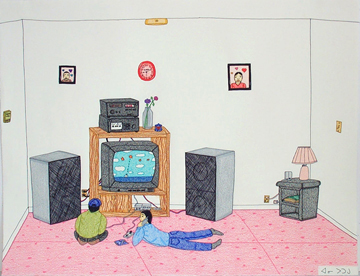
|
Lorna Mills and Sally McKay
Digital Media Tree this blog's archive OVVLvverk Lorna Mills: Artworks / Persona Volare / contact Sally McKay: GIFS / cv and contact |
View current page
...more recent posts
"History does not offer lessons; its unique constellations of contingencies never repeat. But life does offer the same points, over and over again. A lesson is many-edged; a point has only one, but that one sharp. And the point we might still take from the First World War is the old one that wars are always, in Lincoln’s perfectly chosen word, astounding. They produce results that we can hardly imagine when they start. It is not that wars are always wrong. It is that wars are always wars, good for destroying things that must be destroyed, as in 1864 or 1944, but useless for doing anything more, and no good at all for doing cultural work: saving the national honor, proving that we’re not a second-rate power, avenging old humiliations, demonstrating resolve, or any of the rest of the empty vocabulary of self-improvement through mutual slaughter."From a 2004 New Yorker article THE BIG ONE: Historians rethink the war to end all wars by Adam Gopnik (a writer, who makes me fucking crazy with irritation whenever he wastes time and ink on twee little articles about how precious Parisians are.)

Also, read "Vimy" by Pierre Berton because it's an electrifying piece of history writing.
And next year don't get smug on the new white peace poppy pin because it actually hurts those old darlings still standing (or sitting in their wheel chairs) in shopping malls selling the red ones. (they aren't geriatric war-mongers, they have just remained astounded for over 60 years)

T.A.A.F.I. opened Friday night, so today and tomorrow you should spend all your time and money on art at the Drake & the Gladstone.
One early favourite is room 208 at the Drake where you will find The Movement Movement's brilliant sound piece. Do not fear the headphones, the headphones will not control you. Do not fear Jessica Rose and Jenn Goodwin, they are but mere trotting trollops.

The Arts Vote surveys are in for Toronto's municipal election next week. Out of 44 Wards, only 19 have any candidates who bothered to respond. There are four dudes running in my ward and none of them have answered the survey yet. Their names are Nick Boragina, Joe Pantalone, George Sawision, and Hďmy Syed. I do like Hďmy Syed's website, and it's nice that there are some motivated people running against Mr. Shoe-in Pantalone. Maybe I'll bug them all about the survey. Heck, Rob Ford answered it! Actually, Ford's monosyllabic survey response is recommended reading: hilarious, in a what-the-fuck-is-wrong-with-this-world kind of way.

Annie Pootoogook, Saturday Afternoon, 51 x 66 cm, pentel, coloured pencil.
Image taken from Dorset Fine Arts.
Yay! for Annie Pootoogook. She just won the Sobey's Art Award, which makes me happy.
In a recent post I linked to the Wired article about atheism. Here are some more recent tidbits on the themes of science, religion, and neurology.
Philosopher of consciousness and self-proclaimed atheist Daniel C. Dennett had heart surgery and made it through okay.
What, though, do I say to those of my religious friends (and yes, I have quite a few religious friends) who have had the courage and honesty to tell me that they have been praying for me? I have gladly forgiven them, for there are few circumstances more frustrating than not being able to help a loved one in any more direct way. I confess to regretting that I could not pray (sincerely) for my friends and family in time of need, so I appreciate the urge, however clearly I recognize its futility. I translate my religious friends' remarks readily enough into one version or another of what my fellow brights have been telling me: "I've been thinking about you, and wishing with all my heart [another ineffective but irresistible self-indulgence] that you come through this OK." The fact that these dear friends have been thinking of me in this way, and have taken an effort to let me know, is in itself, without any need for a supernatural supplement, a wonderful tonic. These messages from my family and from friends around the world have been literally heart-warming in my case, and I am grateful for the boost in morale (to truly manic heights, I fear!) that it has produced in me. But I am not joking when I say that I have had to forgive my friends who said that they were praying for me. I have resisted the temptation to respond "Thanks, I appreciate it, but did you also sacrifice a goat?" I feel about this the same way I would feel if one of them said "I just paid a voodoo doctor to cast a spell for your health." What a gullible waste of money that could have been spent on more important projects! Don't expect me to be grateful, or even indifferent. I do appreciate the affection and generosity of spirit that motivated you, but wish you had found a more reasonable way of expressing it.Moral philosopher Mary Midgley goes after evolutionary biologist Richard Dawkins again, this time in a review of his recent book The God Delusion for New Scientist (subscription required for full article).
It seems not to have struck Dawkins that academic science is only a small, specialised, dependent part of what anybody knows. Most human knowledge is tacit knowledge - habitual assumptions, constantly updated and checked by experience, but far too general and informal ever to be fully tested. We assume, for instance, that nature will go on being regular, that other people are conscious and that their testimony can generally be trusted. Without such assumptions neither science nor any other study could ever get off the ground, and nor could everyday life.Apparently, Richard Dawkins has a posse.
When we build on these foundations we necessarily use imaginative structures - powerful ideas which can be called myths, which are not lies, but graphic thought-patterns that shape and guide our thinking. This is not irrational: the process of using these structures is a necessary preparation for reasoning. Thus the selfish gene is a powerful idea, so are the Science-Religion war, Gaia, natural selection, progress, and the hidden hand of the market.
Nick Wade reviews evolutionary psychologist and biololgist Marc D. Hauser's new book for the New York Times.
Marc D. Hauser, a Harvard biologist, has built on this idea to propose that people are born with a moral grammar wired into their neural circuits by evolution. In a new book, “Moral Minds” (HarperCollins 2006), he argues that the grammar generates instant moral judgments which, in part because of the quick decisions that must be made in life-or-death situations, are inaccessible to the conscious mind.Helen Phillips reports on the neurological phenonmenon of confabulation in New Scientist (subscription required for full article).
People are generally unaware of this process because the mind is adept at coming up with plausible rationalizations for why it arrived at a decision generated subconsciously.
Dr. Hauser presents his argument as a hypothesis to be proved, not as an established fact. But it is an idea that he roots in solid ground, including his own and others’ work with primates and in empirical results derived by moral philosophers.
The proposal, if true, would have far-reaching consequences. It implies that parents and teachers are not teaching children the rules of correct behavior from scratch but are, at best, giving shape to an innate behavior. And it suggests that religions are not the source of moral codes but, rather, social enforcers of instinctive moral behavior.
There is certainly plenty of evidence that much of what we do is the result of unconscious brain processing, and that our consciousness seems to be interpreting what has happened, rather than driving it. For example, experiments in 1985 by Benjamin Libet of the University of California in San Francisco suggested that a signal to move a finger appears in the brain several hundred milliseconds before someone consciously decides to move that finger. The idea that we have conscious free will may be an illusion, at least some of the time.
Even when we think we are making rational choices and decisions, this may be illusory too. The intriguing possibility is that we simply do not have access to all of the unconscious information on which we base our decisions, so we create fictions upon which to rationalise them, says Kringelbach. That may well be a good thing, he adds. If we were aware of how we made every choice we would never get anything done - we cannot hold that much information in our consciousness. Wilson backs up this idea with some numbers: he says our senses may take in more than 11 million pieces of information each second, whereas even the most liberal estimates suggest that we are conscious of just 40 of these.
Nevertheless it is an unsettling thought that perhaps all our conscious mind ever does is dream up stories in an attempt to make sense of our world. "The possibility is left open that in the most extreme case all of the people may confabulate all of the time," says Hall.
 | Thicket 1: The Voyage is a collaboration between myself and Von Bark, (with protagonists constructed by Jean McKay); a sci-fi narrative depicting space-time adventures in the brain of the animal spaceship. Do you feel empathy for the Kitty-Cat Captain? |
| The installation opens at York Quay Centre on Friday, November 10th, 6-9 pm and closes on Sunday, December 31st. (Join us in the early evening and get warmed up for TAAFI, there's a mass of great shows --including a new video work by L.M.!-- opening at Harbourfront Centre that night.) | |